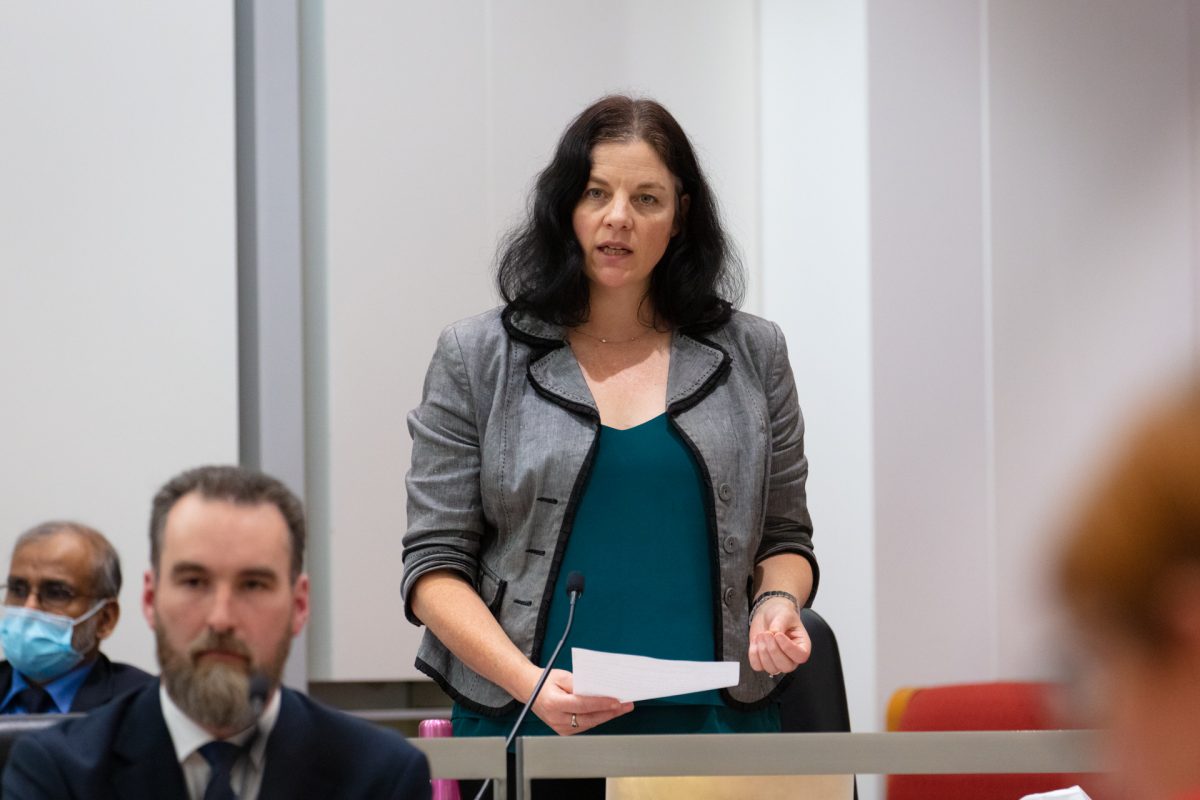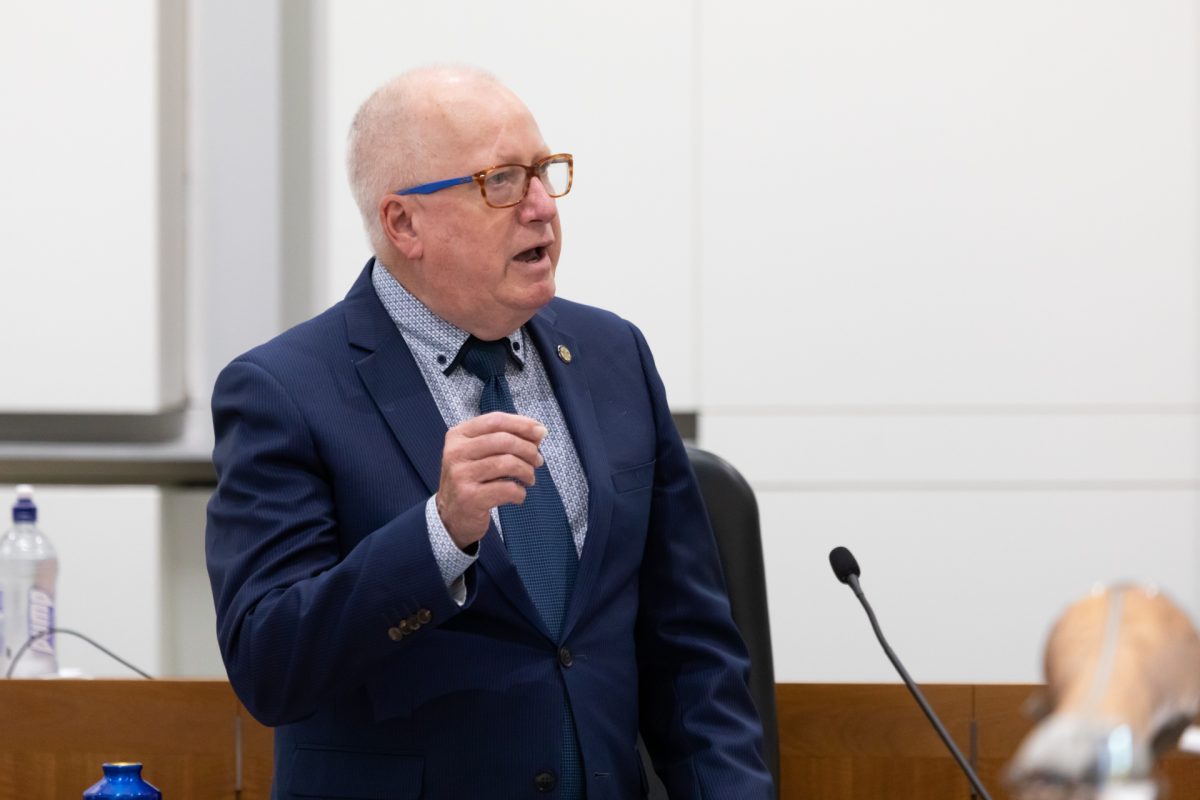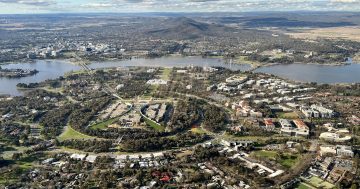
Greens housing spokesperson Jo Clay: “We’ve worked closely with our colleagues on a package of essential reforms to the Bill.” Photo: Thomas Lucraft.
Community concerns about the Planning Bill about to be debated in the Legislative Assembly have been picked up by the ACT Greens, who will propose 19 amendments.
ACT Greens Spokesperson for Planning Jo Clay said the amendments would strengthen environmental protections, improve community consultation and boost housing affordability across the Territory.
Ms Clay said the Greens, whose members stepped out of cabinet so they could negotiate with Labor on the Planning Bill, had secured a commitment from Labor to a governance review within 12 months of the Bill passing, importantly, before the next election.
But it is still unclear which amendments Labor will support, or whether the Greens will look to the Opposition to see them through.
Governance issues, the preservation of green space, looser environmental controls, vague definitions, reduced consultation periods, curtailing of third-party appeals, a lack of Assembly oversight and the declaration of Territory Priority Projects were among the concerns raised by community groups in the Assembly committee inquiry into the draft Planning Bill and reflected in its recommendations.
Planning Minister Mick Gentleman’s official response to the recommendations rejected many and only provided qualified support for others.
The Combined Community Councils of the ACT (CCCACT) called it underwhelming and dismissive and only reinforced the view that the outcome of the planning reform process was always predetermined and that the opportunity for meaningful reform has been missed.
The Greens’ amendments do not cover all of the CCCACT’s concerns but go some way towards addressing them.
The amendments insert stronger wording into environmental and consultation clauses.
They add “protect its natural environment” to the object of the Bill, that “the protection and conservation of biodiversity, habitat, ecological processes and natural systems” must be considered, and strengthen references to climate change and achieving net-zero emissions.
One amendment adds a requirement that consultation must engage stakeholders directly affected in addition to other stakeholders, covering nearby residents, while another defines meaningful consultation to include material that is not just adequate but well-informed.
An amendment also defines timely consultation, requiring it to be early and at an appropriate time, and in the case of significant development, for it to be as early as possible.
The timeframe to notify an environmental impact statement is proposed to be increased from a minimum of 20 working days to 30 working days, and consultation for a revised EIS be not less than 20 working days.

Planning Minister Mick Gentleman: response to inquiry recommendations called underwhelming and dismissive. Photo: Michelle Kroll.
Ms Clay proposes that Territory Priority Projects must meet all four public benefit tests and a declaration be notified as a disallowable instrument to ensure Assembly scrutiny and potential vote, especially when there will be no appeal rights to the ACT Civil and Administrative Tribunal.
She also wants greenfield development to be subject to ACAT appeal, not just to costly judicial review in the Supreme Court.
“This is a serious limitation of third-party appeal rights, and no justification has been given for the removal of these rights, despite the potential environmental implications,” Ms Clay said.
But the scrapping of Controlled Activity Orders is not addressed, removing a potential pathway to ACAT for applicants.
An amendment aimed at transparency will require a decision-maker and the Chief Planner to explain why they did not accept the advice of the conservator of flora and fauna.
Housing affordability has also been inserted into the Bill’s principles of good planning, and another amendment defines it as being “close to essential services, amenities and affordable transport options, including public and active transport”.
The amendments also aim to reinforce ties with already established government positions, such as the insertion of the phrase “must take into account” before “may give effect to relevant outcomes related to planning contained in other government strategies and policies”.
Ms Clay said the Bill needed to be more explicit about protecting the environment, providing meaningful consultation and ensuring accountability.
“We are in an extinction crisis,” she said.
“Environmental Impact Statements must be robust. We need biodiversity protection and clear links to local environmental legislation. We must maintain third-party appeal rights in greenfield areas.
“Our climate crisis means we need to plan our Territory in a way that directly reduces emissions, rather than relying on ‘net zero’ targets. New development must also prioritise access to public and active transport.
“We need affordable housing, not just more housing.”
Ms Clay said those directly affected by development needed early and direct consultation, there must be sufficient community consultation and political accountability when a Territory Priority Project is declared.
She welcomed Labor’s commitment to the governance review.
Ms Clay chaired the Planning, Transport and City Services inquiry into the Planning Bill, which made 49 recommendations for change based on issues raised by the community and industry.
“We’ve worked closely with our colleagues on a package of essential reforms to the Bill. I look forward to the debate in the Assembly,” she said.




















